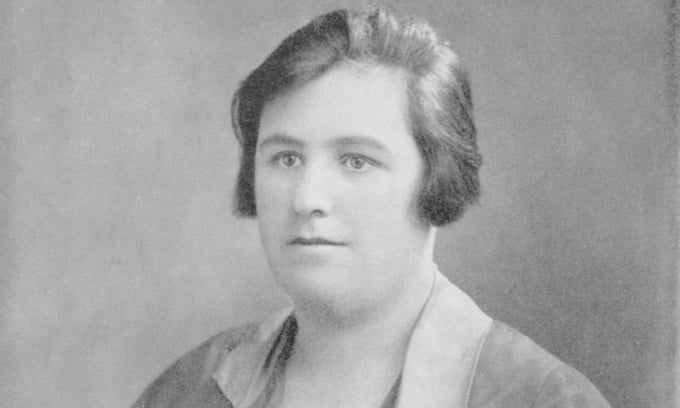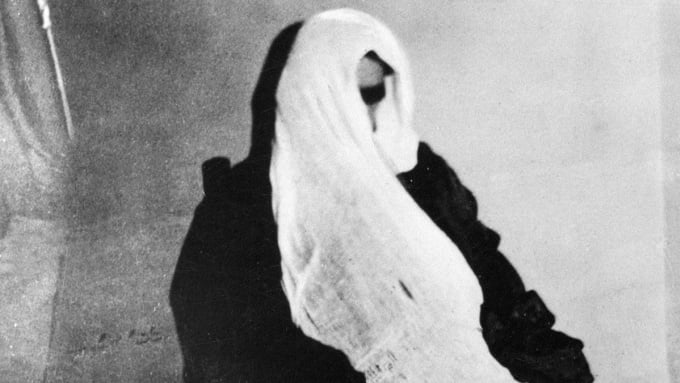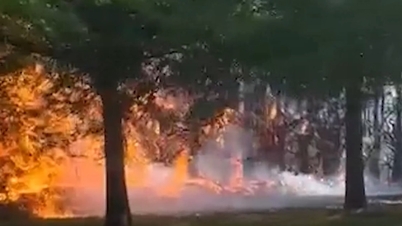Helen Duncan's special "spirit summoning" performances were so famous that they brought her to the attention of British police during World War II.
However, on that early spring day, the Old Bailey was the scene of a very special trial. A psychic named Helen Duncan became the last person to be imprisoned under the Witchcraft Act in England.
Duncan's path to the Old Bailey is filled with state secrets and dramatic raids.

"Meaningful" Helen Duncan. Photo: Wikipedia
Helen MacFarlane was born in 1897 in the small Scottish town of Callander. Nicknamed "Hell Nell," she claimed to have an otherworldly gift: the ability to see spirits.
In 1916, Helen married her husband, Henry Duncan. By 1926, Helen Duncan had become a medium, first practicing in Dundee, Scotland, then traveling around the country, to support her growing family. She had six children.
Duncan conducts her séances in the dark, lit only by a flickering red light. Sitting behind a curtain, she falls into a trance and relies on her "guardian spirits," Peggy and Albert, to complete the ritual.
During the séances, a white substance could be seen flowing from Duncan's mouth and nose, which those attending the séances believed to be a manifestation of the spirit.
As Duncan's popularity grew, she attracted the attention of skeptics like Harry Price, a psychic researcher. With Duncan's permission, Price investigated her in 1931. He believed Duncan to be a fraud. Although unable to reveal how Duncan created the white substance, Price theorized that the substance was simply gauze and egg whites that Duncan had swallowed before the ceremony and then vomited.
Price's conclusions, however, were not convincing enough to Duncan's admirers, who flocked to attend her séances, even as Britain once again teetered on the brink of war.
On September 3, 1939, Britain entered World War II. As the country entered a state of war, the government tightened its control over information to bolster public morale and prevent military secrets from falling into the wrong hands.
The press at the time feared that mediums could become a potential source of leaks. The worry was that if they could conjure the spirits of soldiers, what would stop enemy spies from learning intelligence through séances?
Helen Duncan did not conduct séances for the Nazis, but she was inevitably drawn into the vortex. On May 24, 1941, while she was conducting a séance in Edinburgh, she received “shocking news from the spirit” that a British warship had sunk.
Roy Firebrace, the head of Scotland's military intelligence service, was present at the seance. Firebrace had to keep his identity secret, but he had never heard such news before.
After the ceremony, he checked Duncan's information and learned that the battleship HMS Hood had recently been lost in the Battle of the Denmark Strait. "How did she know before I did?" he wondered.
How did Duncan know about these secret events? The authorities were secretly watching her.
Two years later, Duncan returned to Portsmouth. Among her audience was Lieutenant Stanley Worth, a Royal Navy officer. Worth was skeptical of Duncan's abilities, especially when she claimed to have summoned the spirits of his relatives. In fact, they were still alive.
Eager to expose Duncan as a fraud, Worth attended another séance, this time accompanied by an undercover police officer. Midway through the ceremony, the officer jumped out of his chair, pulled back Duncan's curtain, and arrested her.

Helen Duncan during a seance. Photo: Daily Mirror Archive
At the time of Duncan's arrest, British courts routinely charged mediums with violating the Begging Act, a 19th-century law intended to prevent fortune-tellers and psychics from defrauding the public.
However, the prosecution feared that Duncan could be acquitted because she was accused of holding séances rather than performing "magic". So the authorities charged Duncan with violating the Witchcraft Act of 1735.
In fact, the Witchcraft Eradication Act of 1735 was enacted to eradicate belief in witchcraft. It provided for fines or imprisonment for those who pretended to possess witchcraft powers.
"The law penalized people who made money by fraudulent fortune-telling, healing, or treasure hunting," writes Marion Gibson, author of a book about Duncan.
Although Duncan's trial could have taken place in Portsmouth, judges decided that due to the "unusually serious" nature of the case, she should be tried at London's Central Criminal Court at the Old Bailey.
The trial began on March 23, 1944, and attracted intense media attention. It even attracted the attention of British Prime Minister Winston Churchill, who called the special proceedings "an old-fashioned farce."
On April 3, the jury found Duncan guilty.
On June 6, 1944, just months after Duncan's trial, Allied forces launched a secret attack on Nazi-occupied France. The time between Duncan's capture and the launch of the operation has led some to theorize that the British government targeted her to prevent her from revealing state secrets. Historian Francis Young cautions that "there is no direct evidence to support these rumors," but admits that "the court treated Duncan unusually."
Helen Duncan was sent to Holloway Prison and released after six months. Another person convicted under the law was 72-year-old Jane Yorke. She was fined £5 in September 1944 but did not serve any prison time. The British government repealed the Witchcraft Act in 1951.
After her release in late 1944, Duncan continued to hold séances, making her the target of numerous raids. Duncan's supporters continued to seek her out. Even after Duncan's death in 1956, they continued to petition the British government to have her sentence revoked.
Vu Hoang (According to National Geographic, BBC )
Source link



































































































![Dong Nai OCOP transition: [Part 2] Opening new distribution channel](https://vphoto.vietnam.vn/thumb/402x226/vietnam/resource/IMAGE/2025/11/09/1762655780766_4613-anh-1_20240803100041-nongnghiep-154608.jpeg)













Comment (0)